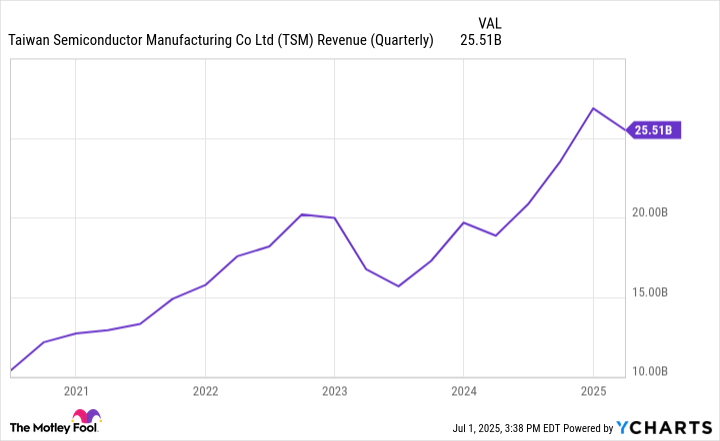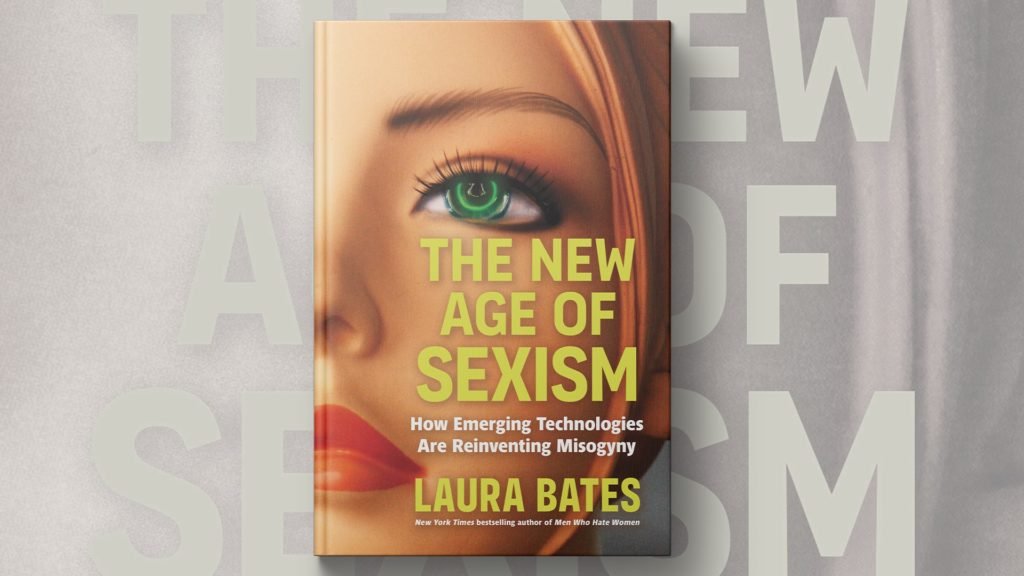AI Research
If I Could Load Up on Any Artificial Intelligence (AI) Stock, It Would Be This One (Hint: It’s Not Nvidia)

Artificial intelligence (AI) has been around for a while, but it gained mainstream popularity in early 2023 due to the rise of generative AI tools like OpenAI’s ChatGPT and Alphabet’s Google Gemini.
Plenty of tech stocks have seen their valuations skyrocket because of the AI boom, but the biggest beneficiary has undoubtedly been Nvidia (NVDA 1.28%). Over the past three years, its stock has increased by nearly 920%, while the S&P 500 has risen around 64% over the same period.
Nvidia has gotten a lot of attention, and rightfully so. Its graphics processing units (GPUs) and AI software are very important to the AI ecosystem. However, there’s another company that Nvidia relies on heavily that’s just as important, and it’s a stock I’m loading up on: Taiwan Semiconductor Manufacturing Company (TSM 0.75%) (TSMC).
TSMC’s role in the AI pipeline
At first glance, calling a manufacturing company like TSMC an AI stock might seem unusual, but it’s a pivotal player in how the technology all comes together. Let’s take a look at how its business works.
TSMC is the world’s largest semiconductor (chip) manufacturer and the pioneer of the foundry business model. You can’t buy TSMC chips in a store or online like a smartphone or laptop. Instead, companies go to TSMC with their chip designs, and it manufactures them, bringing those designs to life.
For example, it makes chips for Apple‘s iPhones, Tesla‘s self-driving technology, AMD‘s processors, Nvidia’s GPUs, and plenty of other applications. TSMC’s relationship with Nvidia and other AI-chip designers is why I’m willing to consider it an “AI stock,” even as a chip manufacturing company.
In fact, TSMC manufactures the vast majority of all high-performance AI chips, so there’s a strong case to be made that without the company and its capabilities, the AI landscape would look significantly different — for the worse.
Money coming in to back up the hype
The increased demand for AI chips is showing up in TSMC’s financials. In the first quarter, its revenue increased 35% year over year to $25.5 billion. It expects its Q2 revenue to come in between $28.4 billion and $29.2 billion, representing year-over-year growth of 36% to 40%. That’s impressive for a company of TSMC’s size.
Data by YCharts.
Just three years ago, in Q1 2022, smartphone chips accounted for 40% of TSMC’s revenue, while high-performance chips (HPCs), which include AI chips, accounted for 41%. Fast-forward to Q1 this year, and HPCs accounted for 59% of revenue, while smartphones accounted for only 28%. This shift in the composition of the company’s top line isn’t showing any signs of slowing down.
Play the long game
One of the risks facing TSMC’s business is the geopolitical tension between Taiwan and China. However, management is working to address this concern by expanding its operations globally. TSMC currently has (or will have soon) manufacturing plants in the U.S., Germany, and Japan. This can help reduce some of its geographical risk.
There’s a reason so many of the world’s top companies rely heavily on TSMC — it’s the best at what it does. Having the most technologically advanced foundries and a large customer base that often signs long-term contracts puts TSMC in a position to have consistent and reliable growth for quite some time.
Trading at 28.9 times trailing earnings as of this writing, TSMC stock isn’t “cheap” by most standards, but it’s less expensive than other well-known AI stocks like Nvidia and Broadcom. And in this case, it’s worth paying the slight premium for this undisputed industry leader, especially if you’re looking for a long-term buy-and-hold position.
Suzanne Frey, an executive at Alphabet, is a member of The Motley Fool’s board of directors. Stefon Walters has positions in Apple and Taiwan Semiconductor Manufacturing. The Motley Fool has positions in and recommends Advanced Micro Devices, Alphabet, Apple, Nvidia, Taiwan Semiconductor Manufacturing, and Tesla. The Motley Fool recommends Broadcom. The Motley Fool has a disclosure policy.
AI Research
‘The New Age of Sexism’ explores how misogyny is replicated in AI and emerging tech

Artificial intelligence and emerging technologies are already reshaping the world around us. But how are age-old inequalities showing up in this new digital frontier? In “The New Age of Sexism,” author and feminist activist Laura Bates explores the biases now being replicated everywhere from ChatGPT to the Metaverse. Amna Nawaz sat down with Bates to discuss more.
AI Research
Creating the future with AI: Loyola University Chicago

Wayne Kimball Jr. (right) and Dean Michael Behnam after Kimball received the 2024 Rambler on the Rise Award from Loyola’s Office of Alumni Relations.
When he was seven years old, Wayne Kimball Jr. sold watermelons on the side of the road in rural North Carolina. A few years later, he would build and fix computers in his neighborhood. With a can-do attitude and drive to find new solutions, he worked his way up from there to being a leader for tech giant Google, where he now serves as the Global Head of Growth Strategy & Market Acceleration for Google Cloud’s Business Intelligence portfolio.
Kimball’s journey has taken him around the globe, from North Carolina to Silicon Valley to the Midwest to his current home in Los Angeles. But regardless of where he has lived and worked, Kimball has remained committed to helping others, both as a Quinlan alumnus and as a community leader.
Exploring new horizons
Kimball had nearly a decade of experience in business operations, strategic investments, and management consulting before he returned to Google in 2020. There, he served as Principal for the Cloud M&A business, and subsequently as the Head of AI Strategy and Operations for Google Cloud.
“Working in corporate strategy roles at Google has a truly fulfilling opportunity because we are building for the future in spaces that don’t currently exist,” Kimball said. “I love the challenge of building the plane while flying it.”
Kimball led the integration of Mandiant, Google Cloud’s largest acquisition. In his current role, he is building global programs to accelerate business growth in alignment with the business intelligence product roadmap, delivering ‘artificial intelligence for business intelligence’ so that customers can talk to their data.
“How AI is applied varies depending on the use case and the industry,” Kimball said. “The application can be broad and scalable, yet very nuanced at the same time. AI in the medical field can be very different from AI in retail or logistics or higher education. There’s a lot of work being done to develop niche solutions for very specific use cases.”
Breaking down barriers
When he’s not seeking the next advancement in AI, Kimball works to elevate others. He says entrepreneurship is what helped him unlock the American dream and build wealth, but he learned early on that opportunity wasn’t always equitable.
“I found that despite the community’s need for entrepreneurship, entrepreneurs of color had disproportionally lower resources, particularly lacking access to networks and capital, which directly impacts opportunity for success and sustainability,” Kimball said.
Throughout his career, Kimball has volunteered and held leadership roles in organizations aimed at lifting and empowering communities that have been historically cut off from opportunity. Wayne has remained civically engaged by serving as the Western Regional Vice President of Alpha Phi Alpha Fraternity, Inc, the oldest intercollegiate historically African American fraternity founded at Cornell University in 1906, along with 100 Black Men of America.
Staying connected
Kimball has remained highly involved with the Quinlan community, with frequent in-person visits to Quinlan classrooms, virtual visits with MBA classes, hosting undergraduate students during the Quinlan Ramble, and meetings with other alumni. In Los Angeles, he is an active member of Loyola’s regional alumni community.
This commitment to Quinlan was recognized in 2024 when Kimball was awarded Loyola’s Rambler on the Rise award, which recognizes alumni who are servant leaders in their communities, exemplify excellence in their fields, and are engaged with Loyola after graduation. Returning to campus to accept the award brought back fond memories. That same year, he was elected to the Quinlan Dean’s Board of Advisors.
“It’s always special when you can go back to the place that contributed so much to the person and professional that you are,” Kimball said. “I was incredibly honored to be nominated, let alone receive the award.”
He credits Quinlan with helping to shape him into the transformational global leader he is today. “I’ve always been a firm believer that you should be proud of where you work, go to school, and your family, and I’m proud to be a Loyola alum and more directly a Quinlan alum,” said Kimball.
Learn more
AI Research
Sam’s Club Rolls Out AI for Managers

Sam’s Club is moving artificial intelligence out of the back office and onto the sales floor.
-

 Business2 weeks ago
Business2 weeks agoThe Guardian view on Trump and the Fed: independence is no substitute for accountability | Editorial
-
Tools & Platforms4 weeks ago
Building Trust in Military AI Starts with Opening the Black Box – War on the Rocks
-

 Ethics & Policy2 months ago
Ethics & Policy2 months agoSDAIA Supports Saudi Arabia’s Leadership in Shaping Global AI Ethics, Policy, and Research – وكالة الأنباء السعودية
-

 Events & Conferences4 months ago
Events & Conferences4 months agoJourney to 1000 models: Scaling Instagram’s recommendation system
-

 Jobs & Careers2 months ago
Jobs & Careers2 months agoMumbai-based Perplexity Alternative Has 60k+ Users Without Funding
-

 Education2 months ago
Education2 months agoVEX Robotics launches AI-powered classroom robotics system
-

 Podcasts & Talks2 months ago
Podcasts & Talks2 months agoHappy 4th of July! 🎆 Made with Veo 3 in Gemini
-

 Education2 months ago
Education2 months agoMacron says UK and France have duty to tackle illegal migration ‘with humanity, solidarity and firmness’ – UK politics live | Politics
-

 Funding & Business2 months ago
Funding & Business2 months agoKayak and Expedia race to build AI travel agents that turn social posts into itineraries
-

 Podcasts & Talks2 months ago
Podcasts & Talks2 months agoOpenAI 🤝 @teamganassi

